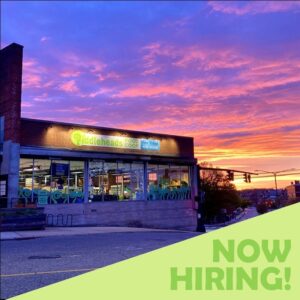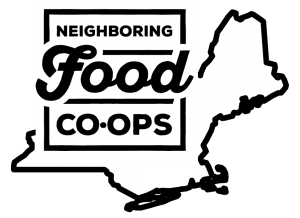 Your Neighboring Food Co-ops
Your Neighboring Food Co-ops
Locally Owned by More Than
160,000 People Like You!
- Co-ops Build Back for Impact!
- Peer -Led Co-op Development
- Credit Unions Are Co-ops Too!
- National Co-op Governance Survey
- Co-op Jobs
- October’s Cave to Co-op Special
- Farm to Freezer: On Sale Now!
- Farmers Union: Training Funds
- Co-op Calendar
October is National Co-op Month and your Neighboring Food Co-ops join other co-operatives and credit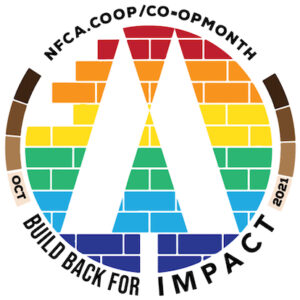 unions across the United States to celebrate as we work to “Build Back for Impact”!
unions across the United States to celebrate as we work to “Build Back for Impact”!
The National Cooperative Business Association CLUSA International (NCBA CLUSA) identified “Build Back for Impact” as the theme for 2021, celebrating how co-operatives are people working together to build more just, resilient, and inclusive communities.
From in-store events, special sales and membership drives to community activities and more, our Neighboring Food Co-ops have been spreading the word about the Co-operative Difference across our region:
- We worked with our partners and Member Co-ops to support statewide Co-op Month Proclamations by the Governors of Massachusetts and Vermont. Monadnock Food Co-op in Keene, NH, and Willimantic Food Co-op in Windham, CT, worked with their mayors on local proclamations. And in the City of Boston, NFCA Startup Member Dorchester Food Co-op celebrated a resolution by the City Council on the important role that co-ops play in our communities.
- Member food co-ops highlighted co-op producers on their store shelves, on websites and in their newsletters. Brattleboro Food Co-op developed a website listing of producers and River Valley Co-op produced a vendor profile video, while Littleton Food Co-op’s podcasts featured Co-op Month topics.
- On the national level, Co-op Month Resolutions were introduced in the U.S. House of Representatives and U.S. Senate.
- Thirty co-ops, credit unions and support organizations — including 7 of our Neighboring Food Co-ops — participated in a group print and online ad in The Greenfield Recorder (MA).
- Co-ops took to the airwaves to share the Co-op Difference including River Valley Co-op (MA) and Valley Alliance of Worker Co-ops (VAWC) on the WHMP Bill Newman radio show focusing on co-operatives. Recording of the program: here
- The NFCA teamed up with co-ops, credit unions, and support organizations across Vermont to host a cross sector Co-op Month Gathering and Celebration in Southern VT and online.
- As part of NCBA CLUSA’s annual Co-op Impact conference, NFCA staff contributed to the International Centre for Co-operative Management’s executive co-op education training on “Operationalizing the Co-operative Identity.” (Stay tuned for future offerings of this training.)
- The NFCA and 14 of our Member Co-ops participated in the Cooperative Development Foundation’s Co-op Hall of Fame, celebrating the induction of Karen Zimbelman of National Co+op Grocers and raising funds for co-operative development.
- Our Neighboring Food Co-ops showed off their Co-op Pride in our annual Co-op Month Photo Competition.
Co-op Month is an opportunity celebrate the contribution that our co-ops make in our communities every day. And this year it was particularly important to leverage our shared Co-operative Identity in the face of some of the biggest challenges we face: a global pandemic, climate emergency and systemic racism. As we build back an economy that works for everyone, our biggest impact comes from embracing the values and principles that make us truly unique.
Peer Dialogs: Principle 6 (Co-operation Among Co-ops) in Action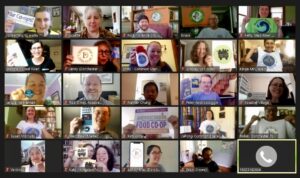
At the heart of our mission is creating meaningful opportunities for our member co-ops to share ideas, resources, and innovations to enhance the success of our member co-ops and their impact within our own communities and across our region.
In recent years, the NFCA has focused on conducting an annual in-person Peer Training, selecting a different department each year and inviting the relevant staff or board members within our co-ops to set our agenda, share information and strategies, and learn together.
But in 2020, the world changed. With a pandemic raging, “business as usual” ceased, forcing us to find new ways of collaborating. In response, NFCA and our member co-ops went online, augmenting our communication systems to build new capacities for online business, communications, and shared learning processes. NFCA peer trainings became peer dialogs via Zoom, and because people didn’t have to travel, we were able to dramatically expand these opportunities.
In response to the challenges introduced by the pandemic, we held a peer dialog for General Managers to share ideas and strategies. This was followed by multiple dialogs for the Bulk and Prepared Foods Departments, given the significant operational challenges those departments were facing as well as opportunities to better support their staff, shoppers, and communities. In 2021, we continued those dialogs and added an ongoing dialog for Board leaders, a training on conflict de-escalation, planning for Co-op Month, and most recently, a session for HR managers on supporting and recruiting staff.
Over the past two years, we built off our existing peer dialogs and held over 22 new peer dialogs and trainings as part of our effort to support and connect our Member Co-ops, building community and providing networking opportunities for managers, staff and directors. These events have been very well-received and rich with information, as noted by José Bonilla, Prepared Foods Manager at Littleton Food Co-op: “It’s an honor to be part of this group…What better way to share and express what we do in our careers than to look forward to these meetings. Helping each other, sharing valuable knowledge that spreads across all of our tables.”
The collaboration and mutual support among our community of co-ops evident within our peer dialogs highlights the importance of having a regional association to be a catalyst in creating opportunities for co-ops to meet and share vital information, knowledge, and strategies.
“Having an organization like NFCA committed to bringing co-ops together on a regular basis is invaluable,” said Sam McCormick, General Manager of Assabet Co-op Market. “As a startup, working towards opening in 2022, the opportunity to hear and get the inside view from co-ops within the region on various facets of their operations is helping us tremendously as we plan and prepare to implement systems in our own co-op.”
The Principle of Co-operation among Co-ops recognizes that co-operative businesses are more successful and can serve their members and communities more effectively when they work together through formal associations. And as a regional co-operative of food co-ops, the Neighboring Food Co-op Association is an example of how co-ops can share resources, ideas, and innovation for shared success. Through networking, trainings, and other support, our member co-ops were in a stronger position to successfully compete and meet the needs of their communities during the pandemic. Our peer dialogs were a particularly valuable opportunity for building relationships and sharing ideas — and were only successful thanks to the dedication and generosity of our amazing community of co-operators willing to share their knowledge, strategies, challenges, and solutions with one another. A huge shout-out to all our co-op staff, managers and board members who participated in NFCA peer dialogs these past two years. You have shown the true essence of our shared values and commitment to mutual self-help, solidarity, and caring for others.
We look forward to another year of co-operation and good dialoging with you in 2022!
Not for profit, not for charity, but for service.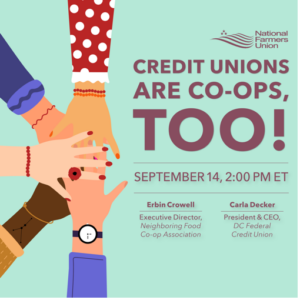
Around the world, co-ops have helped people meet their shared needs and build stronger communities, together. And like other co-operatives, the first formal credit unions developed from traditions of mutual aid such as lending circles in response to the economic and social changes brought on by the Industrial Revolution and the expansion of capitalism in the 1800s. Today, there are an estimated 85,400 credit unions worldwide with 274 million members, including 1 in 3 Americans.
In this webinar, Erbin Crowell, Executive Director of the Neighboring Food Co-op Association and New England Farmers Union Board Member is joined by special guest Carla Decker, President & CEO of the DC Federal Credit Union and Chair of the Board of the Directors of NCBA CLUSA, to discuss the origins and development of the credit union movement, the unique role of Community Development Credit Unions, and how these member-owned financial co-operatives empower people to grow community wealth, support economic development, and build more resilient local economies.
A great primer on credit unions, the video is also a great tool for community education and training for co-op staff, members and directors. Click on this LINK to view the recording.
National Co-op Governance Survey
Member control is one of the key differentiators of a co-operative enterprise.
As we all know, strong governance is essential for the success of co-operatives. Unfortunately, to date no research has systematically examined governance practices of U.S. co-operatives across sectors and over time. Last week, the UW Center for Cooperatives launched the National Cooperative Governance Survey, an exciting initiative that will begin to fill this critical knowledge gap.
The Neighboring Food Co-op Association is proud to be part of this collaborative effort and invites your co-op’s participation in this important survey that will build cross sector knowledge of practices and help our movement support effective co-operative governance.
Look for email from UWCC@survey.wisc.edu with a personalized link to complete the survey via Qualtrics. The email subject line will be: “What’s the key to strong governance? Share your experience to help co-ops thrive.” All data collected will remain confidential and no individual cooperative will be identifiable in the final results.
If you receive the survey, we hope you will take it. By participating in the National Cooperative Governance Survey, you will be contributing to research that will help U.S. cooperatives benchmark, reflect on, and improve their governance practices.
As a token of appreciation for your time and contribution, each participating cooperative will receive discounted access to recordings of the 2021 IMPACT Conference and an advance analysis of the aggregated survey responses. The first 300 participants will also receive a $25 gift card to REI.
When you work at your local food co-op, you’re part of something bigger: You’re also helping to grow a more healthy, just & sustainable food system that works for everyone!
Want to develop new skills, advance your career, and do meaningful work for a business that makes a difference in your community? Come join the co-op team!
From our beginnings, co-ops have been guided by a commitment to shared values of democracy, equality, equity, and solidarity. And across our region, food co-ops have been pioneers in healthy food, sustainable agriculture, and building a more inclusive economy that works for everyone.
And working together, we are increasing our impact. Our food co-ops are locally owned by over 164,000 members, generate annual revenue of more than $382 million, and sell more than $100 million in local products. We also sustain good jobs in the community, employing 2,460 people – 65% of whom are also members, sharing in the ownership of their food co-ops.
Not only is working at your local co-op truly meaningful, it’s also fun working with others who also want to help build a better world. We’d love for you to be part of our co-op community and work to build a more healthy, just, and sustainable food system and a more inclusive economy.
Get more info and to help spread the word: https://nfca.coop/co-opjobs.
October’s Cave to Co-op Special
Bayley Hazen Blue, Jasper Hill, Greensboro, VT
Bayley Hazen Blue is a natural rinded blue cheese. It is made with whole raw milk, primarily with morning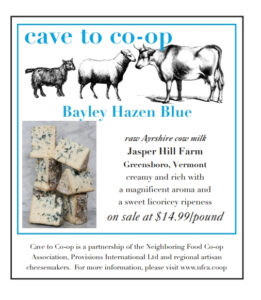 milk, which is lower in fat. Ayrshire milk is particularly well suited to the production of blue cheese because of its small fat globules, which are easily broken down during the aging process which is between four and six months. The paste of Bayley Hazen is drier than most blues and the penicillium roqueforti takes a back seat to an array of flavors that hint at nuts and grasses and in the odd batch, licorice. Though drier and crumblier than most blues, its texture is reminiscent of chocolate and butter.
milk, which is lower in fat. Ayrshire milk is particularly well suited to the production of blue cheese because of its small fat globules, which are easily broken down during the aging process which is between four and six months. The paste of Bayley Hazen is drier than most blues and the penicillium roqueforti takes a back seat to an array of flavors that hint at nuts and grasses and in the odd batch, licorice. Though drier and crumblier than most blues, its texture is reminiscent of chocolate and butter.
Jasper Hill is a working dairy farm with an on-site creamery in the Northeast Kingdom of Vermont. Brothers Andy and Mateo Kehler along with their families began farming and making cheese with a goal of creating a model to be replicated by other farmers in Vermont who wished to diversify their quickly disappearing farms into more workable options. They wanted to demonstrate that it is still possible to prosper on a rocky hillside farm, creating a vehicle for the renewal of our local dairy economy in the form of a business model that can be replicated on other dairy farms. Back in 1998 the bought what was referred to as the “old Jasper Hill Farm” and have been working to fulfill that goal ever since.
The Kehlers developed the Bayley Hazen Blue recipe by starting with a Devon Blue recipe, changing its shape, and altering the aging process to end up with a stable rind that will hold up under typical retail conditions. Jasper Hill’s Ayrshire cows go out on a fresh piece of pasture after every milking during the spring summer and fall and are fed a ration of dry hay through the winter when they stay in, avoiding harsh winter wind and snow while listening to a great selection of jazz and classical music.
Each month our Cave to Co-op partnership between Provisions International and the Neighboring Food Co-op Association (NFCA) offers a delicious regional cheese featured at a great price. Strengthening our local and regional farmers and producers by supporting artisanal cheesemakers is a key goal of the Cave to Co-op program.
Autumn has arrived! Our farmers have been working hard to bring us fresh fruits and vegetables all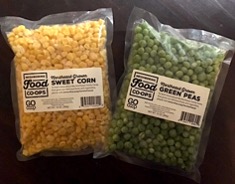 season. Once the harvest season is over, we can still enjoy a variety of local vegetables for healthy family meals and special gatherings. Northeast Grown frozen blueberries, non-GMO sweet corn, and green peas are on sale at participating food co-ops — a great time to stock up!
season. Once the harvest season is over, we can still enjoy a variety of local vegetables for healthy family meals and special gatherings. Northeast Grown frozen blueberries, non-GMO sweet corn, and green peas are on sale at participating food co-ops — a great time to stock up!
Bringing Northeast grown fruits and vegetables to you through your co-op is a part of NFCA’s vision of a thriving co-operative economy, rooted in a healthy, just, and sustainable food system and a vibrant community of co-operative enterprise.
Your local food co-op has the ingredients you need for making soups, stir-fries, and special meals including our frozen fruits and vegetables to keep it local and easy to prepare. Our co-ops have sold three tons of frozen fruits and vegetables through the Farm to Freezer program over the last year, that’s just one of the ways our co-ops work together to bring you fresh, quality food all year long.
Eat healthy and support family farmers with delicious produce from our region. Look for our Northeast Grown Frozen Fruits and Vegetables in the freezer section. They’re easy to find because they’re packed in a clear package so you can see what’s inside!
For more Farm to Freezer information and recipes — like corn crab cakes, autumn vegetable soup or Kay’s Best Blueberry Pie, which are great for family celebrations using frozen corn, peas, and blueberries — visit: www.nfca.coop/farmtofreezer.
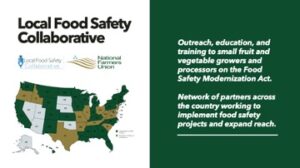
The New England Farmers Union is working with the Local Food Safety Collaborative (LFSC) to reduce financial barriers for farmers to attend Produce Safety trainings. Are you or do you know a farmer that could benefit from attending a Produce Safety Alliance (PSA)?
The National Farmers Union Foundation’s LFSC coordinates funding from FDA and USDA to provide training, education, and technical assistance to local food producers across the country. Its core mission is to build fundamental knowledge of food safety and support compliance with Food Safety Modernization Act (FSMA) regulations. There are funds available for farmers in our region to attend PSA training at reduced or no cost.
The PSA Grower Training is one way to satisfy the FDA’s Food Safety Modernization Act (FSMA) Produce Safety Rule requirement outlined in §112.22(c) that requires ‘At least one supervisor or responsible party for your farm must have successfully completed food safety training at least equivalent to that received under standardized curriculum recognized as adequate by the Food and Drug Administration.’
“Food safety is a critical component of good farm management, and we are fortunate to be working with LFSC to reduce barriers for rural farmers in building their food safety knowledge” notes Roger Noonan, NEFU Board President and organic farmer.
There are Online and Remote courses available now and an in-person New England course could be scheduled in early 2022 if there is enough interest. Online delivery course is a three-week course that can be completed at your own pace. The online course is expected to take 15-30 hours for successful completion. Remote delivery course is a course led in real time by instructors delivered with video conferencing software, such as Zoom or Webex. This is a temporary option that is being supported during the COVID-19 outbreak.
For a schedule of upcoming courses see the Produce Safety Alliance webpage.
Please contact Suzette Snow-Cobb, suzette@nfca.coop if you are interested in an in-person course or if you would like the available PSA training registration at no cost.
Our Local Farmers & Fishermen Need You!
Do you care about where your food comes from and want to support the people who produce it? Join the NEFU as a Friend of the Farmer for just $15. Your membership will help ensure that our region’s producers and consumers are heard by policy makers here at home and in Washington, DC. For more information, please visit www.newenglandfarmersunion.org.
For More Co-op Events, Visit https://nfca.coop/calendar
The Neighboring Food Co-op Association (NFCA) is a co-operative federation of over 40 food co-ops and startup initiatives across New England, working together toward a shared vision of a thriving co-operative economy, rooted in a healthy, just, and sustainable food system and a vibrant community of co-operative enterprise.


